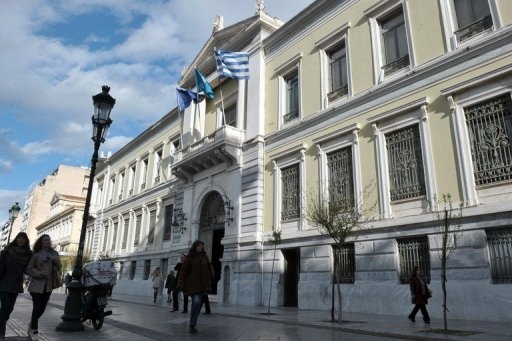Greece borrows at steady rates as buy-back ends
 The debt agency borrowed the money via a one-month issue at 3.99 percent, a slightly higher rate than during its last comparable issue, and via a six-month issue at a slightly lower rate of 4.38 percent.
The debt agency borrowed the money via a one-month issue at 3.99 percent, a slightly higher rate than during its last comparable issue, and via a six-month issue at a slightly lower rate of 4.38 percent.
Meanwhile, the agency concluded an operation to buy back existing Greek bonds at a big discount on Tuesday, to unlock the latest instalment of urgently needed bailout funding from international creditors.
Under the buy-back, Greece was supposed to purchase 30 billion euros' worth of existing debt from private bondholders at a heavy discount to their face value so as to reduce the debt mountain in line with targets set by the IMF and EU.
A source close to the operation, who declined to be identified, said that the target was exceeded after the deadline was delayed until mid-day on Tuesday.
Greek news media reported that Greek banks that had initially committed 10 billion euros' worth of bonds to the scheme ended up committing their total 15 billion euros in eligible holdings.
A European diplomatic source told AFP the buyback will reduce Greece's debt to output ratio in 2020 to 126.6 percent, a level that was largely expected but still slightly short of the 124 percent stipulated in the latest version of the country's second rescue deal.
Eurozone ministers will still have to "confirm the overall settlement," the diplomatic source said.
Greece, in the process of tying up the redrafted second rescue by the International Monetary Fund and European Union, is unable to borrow medium and long-term money on the sovereign debt market. For several months it has been raising funds with short-term issues, usually for three to six months, and usually for less than 2.0 billion euros on each occasion.
Greece was at risk of being unable to pay its bills and redeem previous debt by the end of the year until the IMF and EU agreed to release the latest instalments of bailout loans, conditional on new budget measures which Greece has accepted, and also subject to an agreement between the IMF and EU on how to manage the mountain of long-term Greek debt.
This redrawn agreement for the release of the instalment from the middle of December depended on the success of the bond buy-back for which Greece has had to extend the deadline to ensure adequate acceptance by private bondholders.
The instalment of bailout money has been held up since June. Greece, in order to be able to redeem bonds reaching maturity, decided to issue new debt in November and December to raise money to repay the old debt.
In November, Greece was able in this way to redeem debt worth 5.0 billion euros. By the end of December it must redeem bonds worth about 7.0 billion euros to avoid default.
Eurozone finance ministers were to confer by telephone later on Tuesday to assess the Greek debt buy-back. If the operation is deemed a success, the ministers are expected to clear the way at a meeting in Brussels on Thursday for the release of 44 billion euros in four slices up to March.
With Tuesday's one-month debt issue, Greece raised 2.732 billion euros at 3.99 percent, compared with 3.95 percent at the last similar issue on November 13.
With the six-month issue, it raised 1.625 billion euros at 4.38 percent, compared with 4.41 percent on November 6.
The initial issue at one-month amounted to 2.125 billion euros and this was 1.3 times subscribed, and for six months the initial amount was 1.625 billion euros and this was 1.54 times subscribed.
An issue for redemption within six months carries far less risk for investors than would an issue of longer maturity, unless they consider that Greece could go bankrupt at any moment.
What the stars mean:
★ Poor ★ ★ Promising ★★★ Good ★★★★ Very good ★★★★★ Exceptional
Related Contents
Latest News
More News
- Russian President congratulates Vietnamese Party leader during phone talks (January 25, 2026 | 09:58)
- Worldwide congratulations underscore confidence in Vietnam’s 14th Party Congress (January 23, 2026 | 09:02)
- Political parties, organisations, int’l friends send congratulations to 14th National Party Congress (January 22, 2026 | 09:33)
- 14th National Party Congress: Japanese media highlight Vietnam’s growth targets (January 21, 2026 | 09:46)
- 14th National Party Congress: Driving force for Vietnam to continue renewal, innovation, breakthroughs (January 21, 2026 | 09:42)
- Vietnam remains spiritual support for progressive forces: Colombian party leader (January 21, 2026 | 08:00)
- Int'l media provides large coverage of 14th National Party Congress's first working day (January 20, 2026 | 09:09)
- Vietnamese firms win top honours at ASEAN Digital Awards (January 16, 2026 | 16:45)
- ASEAN Digital Ministers' Meeting opens in Hanoi (January 15, 2026 | 15:33)
- ASEAN economies move up the global chip value chain (December 09, 2025 | 13:32)

 Tag:
Tag:




















 Mobile Version
Mobile Version